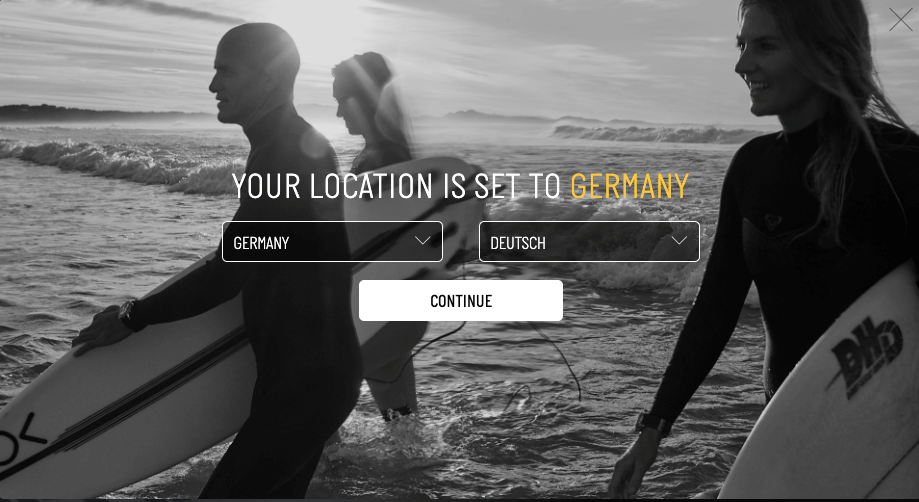

International companies have to think and act bigger. When they take their offline business online, a thorough international search engine optimization becomes all the more important.
Also Breitling, one of the best-known brands in the watch industry, is aiming to sell more luxury products online. Together with WEVENTURE, special measures have been designed and adopted to make sure that the correct country versions of the page searched for are displayed in the SERPs for each market requested.

Serving different markets also means the challenge of taking into account different currencies and very different shipping and logistics conditions.
Most importantly, a user in the USA should only come to see products that are available on the American market. But this is exactly where online marketers face very big challenges. For example, in many countries in the world, people speak English. As a result, search queries do not vary or vary only to a small extent.
If a potential customer in the US wants to buy a Breitling, they might search for “buy Breitling watch”. If a potential customer in the UK wants to buy a Breitling, they might also search for “buy Breitling watch”.
An analogous scenario might of course apply to users from Germany, Austria and German-speaking Switzerland.
As for Breitling, it is important to know that not all countries were released for online sales and shipping at the same time. While a purchase in the US was already possible, e-commerce for the UK was set to be rolled out only 6 months later. It was therefore highly important that any potential customer from the US would land on a product page that displays prices in dollars and offers the possibility to buy watches. The UK user, on the other hand, should get directed to a product page with prices in pounds and a pre-order function.
The correct country allocation is also important when it comes to shipping options. In order to guarantee shorter delivery times and safer routes, the products are only sent within the country or within a defined group of countries.
Talking about international SEO, the hreflang tag constitutes an extremely important factor. But what can you do if the hreflang tag is correctly implemented, but the wrong country versions of the website still end up in the search results?
1. Former URL changes and backlink impact
Before starting with any e-commerce activity, the URL structure had to be adjusted with a view to best-practice international SEO. It was decided to use only one domain (Breitling.com) and to define the country and language in the first directory of the URL. Before the changeover, only the language was displayed in the directory and then forwarded depending on the IP.
Since the decision was made at that time to forward any English-language page from Breitling.com/en/ to the American version Breitling.com/us-en/, the US page was significantly boosted. All backlinks from external websites (whether from British or American ones) were redirected to the American site.
The result: The US page had become more important to Google than its British equivalent.
The big advantage of using only one main domain (.com /) lies in the fact that the individual SEO strengths of your various country versions are concentrated on one domain. When opting for country-specific domains (e.g. weventure.de), by contrast, you must be aware that in an international strategy, each domain (.de, .ch or .uk) will have to fight for SEO strength and visibility on its own.
Furthermore, the question was how to strengthen the various language-country combinations in a well-balanced manner so that the correct version would be displayed in the correct region.
2. Crawl budget: Various language combinations for each country
In addition, the decision was made to start e-commerce activities in around 130 countries with various language combinations. For the Swiss website alone, this meant a total of five language variations:
On the one hand, this leads to countless possible language-country combinations to choose from for the user, thereby offering the best possible user experience; on the other hand, unusual combinations such as “Chinese in Italy” come with a very low search volume. Of course, these sites still have to be crawled by the search engine during Google’s indexing process, which puts a significant strain on the crawl budget. As a result, the important pages of the website may not be visited regularly by the Googlebot. The use of robots.txt can relieve pressure on the crawl budget. In our case, however, pages were excluded to such a degree that no suitable combination at all could be found for certain countries. So the challenge here is: How can you index relevant language-country combinations and at the same time manage the crawl budget effectively?
Moreover, despite translating all the relevant content pages, some teasers for certain watches were partly still in English on the German, French and Italian pages.
Google uses various signals in order to decide which language version is displayed to the user in the SERPs (Search Engine Result Page). The most important of these are Google’s geolocation, the hreflang tag, the language chosen on the website and external signals via linked domains.
1. Making sure backlinks point to the right countries
In the past, the backlinks from partners or publications were directed to the root domain (Breitling.com – without country specification). Based on an internally arranged forwarding system, the user got re-directed to the country-language directory that was recognized for them. This practice is okay, but in this case Google can no longer draw any geographically based conclusions from the backlink. It is therefore a much clearer and more useful approach if websites from Germany refer directly to Breitling.com/de-de/ – or websites from France to breitling.com/fr-fr/ etc.
To ensure this approach is followed in the future, a detailed set of instructions has been developed and made available for the relevant department
2. Strategic handling of the crawl budget and the various country-language variations
As mentioned above, robots.txt caused many directories to get excluded from crawling, so that some countries could no longer be found in the search results. Instead, you could always find a page variant with an incorrect country allocation.
In this context, we first collected all the information and analyzed which country-language combinations make sense and which can at least be excluded from Google’s crawling and indexing processes. This includes, for example, the combination of any European country with the Chinese language.
Moreover, there are many pages that feature Breitling sales partners and their addresses, but contain no additional unique content. Deindexing these pages makes it possible to direct the focus to the important content and product pages.
We also checked that the robots.txt had been cleaned up to the point that at least one country-language combination could be crawled and indexed by Google for each country.

3. Correct translation of pages
The Google Bot is working in a text-based manner. This means that the content of a page (text, images with an alt tag, …) is extremely important in order to make Google understand what the page is actually about. In this regard, the language used plays a decisive role here. On a German website, the content should be written in German, on an Italian site in Italian, and so on. As Breitling still had some pages with untranslated text passages, we extracted them with the Screaming Frog tool via an XPath query, had them translated and transferred them to the corresponding pages.
Conclusion: International SEO is so much more than just using the hreflang tag. First of all, it is crucial to send Google as many clear signals as possible in order to assure suitable landing pages in the SERPs. The bigger a page is and the more countries that need to be managed, the more complex the topic.
It is therefore important to be able to rely on a partner that always keeps track and fulfills this challenging task. At Breitling, by permanently controlling all relevant signals, we have achieved an accurate display of country URLs in over 95% of queries.